Цикл уроків з англ. мови для учнів 8 класу з теми "Mass Media"
Цикл уроків з англійської мови
OBJECTIVES:
- To widen students’ knowledge on the topic;
- To practice students’ speaking, reading and listening skills;
- To develop students’ logical thinking, communicative activity;
- To teach students to work in groups and feel the responsibility for doing their work well;
- To develop the culture of communication in different situations.
Mass media. Different kinds of mass media.
Teacher: Good morning, children! I’m very glad to see you today. How are you? Who is absent? I hope you are ready for our lesson. The topic of our lesson today is “Mass media. Different types of mass media.”
I got a message yesterday. The students sent it to me. Listen to it, please.
Hello, Natalia Victorovna!
We have been really busy lately. Our new friends wanted all the students from the Green High School know about us. They organized a press-conference where there were a lot of journalists. They asked a lot of questions about our country and our school. They were eager to know how we live. The press conference was shown on TV and all the newspapers wrote about us, too. Then we were invited to the radio station to answer the questions. So now we are really tired and want to have some rest.
Answer the questions on the text.
- Did foreign students want to know about the students from Ukraine?
- What did they organize?
- Who asked questions to the students? Where could people get information about press-conference from?
- What is mass media?
PI: Mass media is TV. Mass media is the Internet, etc.
- Reading comprehension.
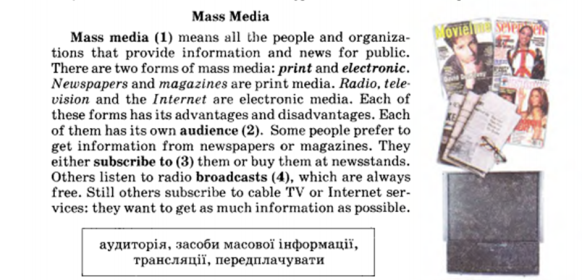
- Pre-reading activity.
- In this text you will find some new words. Repeat these words after me, please. Find Ukrainian equivalents to these words.
- Read the text quickly and say what two main forms of mass media you can name.
- Post-reading activity.
- Read the text again and match the activities given below with the corresponding kinds of mass media:
|
advertise |
|
|
broadcast |
|
|
buy |
|
|
listen |
|
|
read |
|
|
publish |
|
|
use |
|
- Work in groups, please. Each group should match the professions with the corresponding kinds of mass media and explain your choice.

- Discussion.
We can’t get along without mass media, can we? Let’s discuss the following questions.
- Which kind of mass media do you often use?
- What do you use them for?
- What functions do mass media perform? (advertise, attract attention, educate, entertain, form opinions, inform, support some business or policy, etc.)
Divide into 4 groups and find some advantages and disadvantages for each kind of mass media. Then we shall discuss this problem.
- Home task.
Some people believe that there will be no newspapers, radio, TV in the future. The Internet will become the only source of information. How do you see the future of mass media? That will be your home task.
- Reflection. Summary.
Today we have read and spoken about the main kinds of mass media. What are they? Each kind of mass media has advantages and disadvantages. What types of today’s activity did you like most of all? Your marks are ... Thank you for your work. Good-bye.
LESSON 2
Mass media. Different kinds of newspapers.
Procedure.
- Greeting. Introduction.
Good morning, children! I’m very glad to see you today. How are you? Are you ready for our work? We continue to speak about mass media and today’s topic is “Different kinds of newspapers”.
- Warming-up activity.
What kinds of mass media do you know?
People of what professions can work in mass media?
How do you see the future of mass media?
- Listening.
Listen to people talking about this problem and decide who of these people you agree with.
- I choose the news from what we have read in the newspapers or magazines. Then I use the Internet to get more information. I don’t think the Web has changed the way people get information - well, most of people in this country read about events.
- I don’t spend hours surfing the Internet for news. The print version is still in the first place. I do think newspapers and magazines will still be around in 10 year time, but the move of electronic media will continue.
- I don’t read any newspapers and magazines in print, but on the Internet. I think online operations have become more important because the Internet has the advantage of speed. But TV and radio are convenient and comfortable - and I’m sure the Internet will kill off broadcasting or the press.
So, how do you see the future of mass media?
(Pupils present their opinions on this problem.)
- Reading.
Which of you read newspapers?
How often do you read them?
Do you subscribe to them or buy them?
What newspapers do you read?
- Pre - reading activity.
- Look through the text and match the words in bold type with their Ukrainian equivalents.
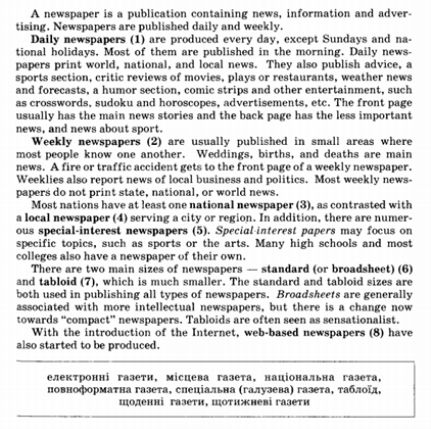
- What is this text about?
- Reading activity.
- Fill in the table:
|
Type of newspapers |
Published news |
|
Daily newspapers |
|
|
Weekly newspapers |
|
2) Make up the questions to the text.
- Post - reading activity.
- Answer the questions on the text.
- Look at the pictures and describe each newspaper.
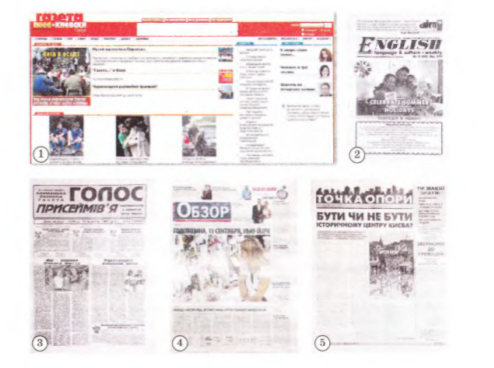
5. Discussion.
1) There are different kinds of newspaper publications, read them and match them with their Russian equivalents. Give the titles of such publications.
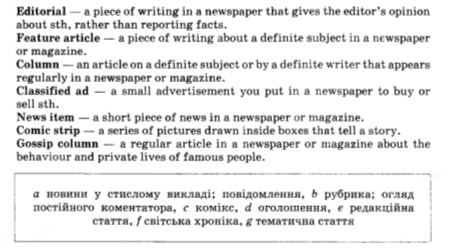
- Divide into 5 groups and answer the following questions:
- Do you prefer to read daily or weekly newspapers?
- What do you like to read about?
- What is your favorite section in a newspaper?
- What are the most boring sections to your mind?
- Do you begin to read newspaper from the first page or from your favorite section?
(Each group works out the answers and present general information on the problem.)
- Summary.
So, pupils our lesson is coming to the end. I would like to listen to your impressions of our lesson. Was it informative? What new information have you learnt?
I’m pleased with your work today.
- Home task.
Take any local newspapers and describe it.
LESSON 3
Mass media. Kinds of TV programmes.
Procedure.
- Greeting. Introduction.
Good morning, dear pupils. How are you? I’m glad to see you today. At our lesson we are going to speak about TV, we shall learn about different kinds of programmes.
- Warming-up activity.
Before speaking about TV I would like you to revise some material about newspapers.
And I want to know what your favorite newspapers are. (Pupils give general information about newspapers.)
- Main part of the lesson.
- Divide into four groups and discuss the following questions.
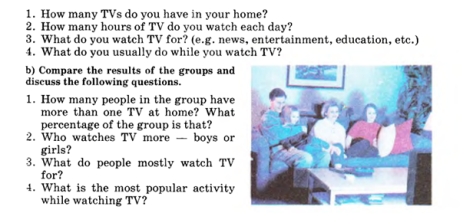
(All the answers are written down on the blackboard.)
- Listening comprehension.
Listen to the text and compare the results of your groups with the results of the survey in Great Britain. What do they have in common? What are the differences?
Millions of British people spend about 14 years watching TV, that is every day they watch TV about 5 hours. The survey shows that women are more dependent on TV than men; and that one of three families owns two TVs. Eating is the most popular activity while watching TV. But people can also speak on the phone and read a book or a magazine. Half of people use TV for the latest news, football scores and weather forecasts.
- Speaking.
1) There are many TV channels nowadays and people watch different programmes. What programmes do you prefer to watch? (Pupils give possible answers.)
Programmes can be grouped together, for example
Час Новин
Дзеркало
Время
- часа may be grouped into news broadcast.
- Read the definitions and match them with the kinds of programmes.

- Now look at the pictures and name kinds of programmes. Can you give other examples of such programmes?

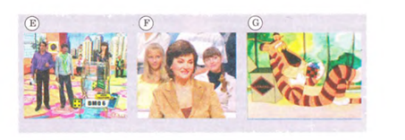
- Look through the TV programme. Match the shows with the kinds of programmes. Give arguments.

- Divide into four groups. Imagine that you can choose the programmers shown on TV channels in the evening. Fill in the chat below with the names of TV programmers and say what types they are.
|
Time |
Channel 1 |
Channel 2 |
Channel 3 |
Channel 4 |
|
7-8 p.m. |
|
|
|
|
|
8-9.30 p.m. |
|
|
|
|
|
9.30-10.00 |
|
|
|
|
|
10.00-11.30 |
|
|
|
|
|
11.30-01.a.m. |
|
|
|
|
- Summary.
So pupils, our lesson is coming to the end. I would like to listen to your impressions of the lesson. What activity did you like most of all? What new information have you learnt?
I’m pleased with your work. Your marks are ...
- Home assignment
Write down about advantages and disadvantages of TV.
LESSON 4
Mass media. TV influence on people.
Procedure
- Greeting. Introduction.
Good morning, children. I’m very glad to see you today. How are you? Who is absent?
I hope you are ready for our lesson. Today we shall speak about advantages and disadvantages of TV and find out how TV influences people.
- Warming-up activity.
Last lesson we spoke about TV and different kinds of programmes.
What programmes do you like to watch? Give examples of such programmes.
I see that you like watching TV very much. TV is now so popular that it is hard to believe that it appeared only about 50 years ago. It plays an important part in people’s lives. But is it a good thing or a bad one? Haven’t we become lazier because of television? What are its advantages and disadvantages?
(Pupils speak about this problem.)
- Listening comprehension.
Television can be very useful, especially when you learn foreign languages. There some educational programmes on TV.
- Pre-listening activity.
- Do you agree that TV can help people to learn a foreign language?
What programmes should a person watch to learn a language?
- Before listening to the text mind the meaning of some words from the text:
fluently - able to speak language very well, with no mistakes
to pick up - to learn something by watching or listening to other people pattern - the regular way in which something happens, develops, or is done.
- Listening.
When I first came to live in Spain, I could not speak any Spanish. I had to learn to speak fluently because of my job. Some friends suggested buying a television and this turned out to be really a good advice. At first, I didn’t really understand anything at all, but little by little I began to pick up the main ideas. I would read an English newspaper the same day so I knew what was happening around the world anyway and I could understand the news. But the best programmes for learning Spanish were the game shows. I must have watched hundreds of them in the first few months after I came to live here. Because the same patterns are repeated again and again you learn the rules of the language almost automatically. Despite the fact that they were not the kind of programmes I would normally have watched, I began to like them. Although I speak Spanish well now, I still watch them sometimes.
- Post-listening activity.
- What language did she want to learn? Why?
- What did her friends suggest doing?
- What programmes were the best for learning Spanish?
- How many programmes did she watch?
- How did they help her to learn Spanish?
- Reading comprehension.
- Pre-reading activity.
- TV can badly influence people, especially children. You know there is much violence on TV, children are becoming angrier. What should their parents do? Discuss this question in groups.
- Before reading the text be sure to know some new words:
To ration - to allow someone only a small amount of something
Habits - something that you do regularly or usually, without thinking about it
Device - a machine or a tool that does a special job
Gadget - a device
To reduce - to make something smaller or less in size, amount or price
To go blank - to turn off
Skills - an ability to do something well
To outwit - to gain an advantage over someone using tricks or clever plans
- Reading.
Parents are soon to be offered the ultimate weapon to win the wars over how much TV their children watch. Instead of constantly fighting to ration viewing habits, they will have a coded electronic device.
It will switch off the TV set, leaving the child to turn to other activities such as reading or even playing in the fresh air.
The gadget, “TV Allowance”, was invented by Miami photographer Randal Levenson, a former engineer, who despaired of reducing his three children’s screen time.
“There was a lot of anger in the house about the TV,” said Mr. Levenson.
The Levensons now use the code. Each child has his own code, and when his time is up, the screen goes blank. Mr. Levenson can find out how much time is left by touching a button. The gadget that will be sold in Britain for £49 this summer, controls video games and the video. It can block out specific periods such as homework time and can’t be disconnected by children. “They’ve got their lives back,” said Mrs.Levenson. “They certainly spent too much time in front of TV. The problem was that we were giving up. We could only say “NO” so many times.”
“I thought ‘Oh, this is really going to be horrible’, said one of Mr. Elverson’s children. “Then we got to live with it, I think my vocabulary is ten times bigger now because I’m reading more.”
“It teaches children time management and other business skills,” said Mr. Levenson. “My children have come to find that there are other things in life besides sitting and watching TV.”
- Post - reading activity.
1) Read the statements below and guess if they are true or false.
- Television ration box is on sales in many shops in Britain.
- This electronic device will tell the child when he must watch TV.
- The gadget was invented by a frustrated parent.
- Children in the family are allowed to watch TV at any time they want.
- “TV Allowance” can discipline the children.
- Children will not be able to regulate the device.
- Children can outwit the gadget.
- Children never get used to TV limitation.
3) Agree or disagree with the statements. Give your arguments.
- TV kills the conversation in the families.
- TV has led to an increase of violent crimes among young people.
- Parents should not limit the amount of TV their children watch.
- Children have to learn to be selective in watching television.
- There are more entertaining than informative programmers on TV now.
So, you should understand what programmers to watch and for how much time.
- Home task.
- Summary.
So, pupils our lesson is coming to the end. I would like to listen to your impressions of the lesson. What have you learnt? Your marks are ...
Thank you and good-bye.
LESSON 5
Mass media. The Internet.
Procedure.
- Greeting. Introduction.
Good morning boys and girls. I’m very glad to see you. How are you? I hope you are ready for our lesson. Today we shall speak about the Internet one of the most important sources of getting information.
- Warming-up activity.
What computer and software companies do you know?
Which company did each of these people create?
|
Roger Foster
|
Sun |
|
Bill Gates
|
Microsystem |
|
Steve Jobs
|
Apple |
|
Scott McNealy
|
Hewlett Packard |
|
|
Microsoft IBM |
|
|
Apricot |
Make sure that you know all the necessary computer terms. Match the definitions with the Internet terms from the text.

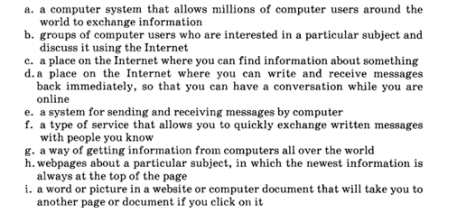
- Reading comprehension.
- Pre - reading activity.
- Have you got a computer at home?
Do you use the Internet? What for?
What software programmes are you familiar with?
Do you use e-mail?
Do you think the Internet will have an important influence on our daily lives?
- Add another word, abbreviation or part of the word to complete “computer’' words and phrases.
.... pages
hyper ...
... messages
... web
... rooms
3) Can you remember what these symbols mean? Teacher shows the pictures of symbols.
a) print b) open a new document c) cut d) save data e) copy f) open the existing document.
- Reading the text.
- Post-reading activity.
Answer the following questions:
What do people use nowadays?
What is the difference between Internet and World Wide Web?
How are documents in WWW called?
Why are chatrooms so popular?
What are the advantages and disadvantages of Internet?
4. Communicative activity.
Make up dialogues using the following hints and express your own attitude.
To learn much from computer
To play computer all the time
Not to learn about life from computer
To be useful
More information on the Internet
Too bad for health
Games are great
Send e-mails to each other
Make new friends
To be the door to the world
To spend too much time surfing the Internet
To talk less
A lot of shooting and killing
- Work in groups.
Create a poster illustrating one of the following “Internet proverbs”
- You can’t teach a new mouse old tricks.
- Too many clicks spoil the browser.
- There is no place like http://www.home.com.
Give arguments to your posters.
- Home task.
Make a presentation of a newspaper or a TV channel.
- Summary.
LESSON 6
“There are only two forces that can carry light to all comers of the Globe - the Sun in the heavens and the Associated Press.”
Mark Twain.
Procedure.
- Greeting. Introduction.
Good afternoon, everybody! Sit down, please. How are you today? I hope you are well. Today we are going to have a lesson devoted to mass media. People always wanted to be well informed in current events. They used to read newspapers, books and magazines. Mark Twain once said: “There are only two forces that can carry light to all corners of the Globe - the Sun in the heaven and the Associated Press.”
The world is changing rapidly, new types of mass media appeared: radio, TV, Internet. All events are reflected in them. We may say that mass media are in control of most spheres in the life of society.
- Warming-up activity.
- Brainstorming. What things do you associate with the words “Mass media”?
- Speaking about mass media we can’t do without certain vocabulary. You have the cards. Your task is to divide the words into four categories and fill in the columns.
|
The Internet |
|
|
Types of TV programmes |
|
|
Newspaper articles |
|
|
People working in mass media |
|
Words: editorial, DIY programme, game show, blogs, journalist, comic strip cartoon, news editor, hyperlink, e-mail, graphic, artist, chatrooms, news broadcast, gossip column, world wide web, news writer, reality TV.
Read the words from the columns.
- Listening.
Do you know anything about the history of TV?
If not, listen please. Fill in the gaps in your cards.
History of television.
TV is one of the most important means of communication. It brings moving pictures and sounds from around the world into millions of homes.
The name “television ” comes from Greek word meaning “far ”, and a Latin word meaning “to see”, so the word “television ” means “to see far Speaking about mass media we should keep in mind that they comprise both TV and the press. What’s the history of press?
History of the newspapers.
The first newspapers were probably handwritten newssheets posted in public places.
The earliest daily newssheet was “Acta Diurna ” which started in Rome in 59 B.C. Tthe first printed newspaper was Chinese publication called “Dibao ” started in 700 A. D. The first regularly published newspaper in Europe was “Avisa Relation ” or “Zeitung” started in Germany in 1609.
- Speaking.
Work in groups. Present your problem and your attitude to the value of mass media in a modern society. The talks for the groups:
Group 1 Press (interesting and easy to read, full of information, very useful, read facts, spread some international news).
Group 2 TV (makes you relax, makes you think, it’s a chewing gum for eyes, much violence).
Group 3 The Internet (find information for hobbies, sports, current events, play games, buy things, plan holidays, make new friends).
- Role play.
- Dear pupils, have a surprise for you. We have two guests - the editors of a school newspaper “School times”. They would like to present their newspaper to us. Hope, you will find its articles interesting and useful.
- Hi, we are glad to welcome you!
- Hello. We are members of the editorial board of school newspaper.
- Our newspaper is called “School times ”. It is about teenagers - about us our interests, hobbies, problems.
- Let’s look through the newspaper. The primary attention is certainly given to the article “ ... ”.
- You ’ll have a very good time reading the column “The ideal pupil is ... ” Well, so many people, so many minds.
- Let’s turn to the third page, where you can find the article “Press in Great Britain ”.
- We come to the last page. You want to laugh - read some funny stories; need a food for thought - do a crossword. And also you can read the music hit parade and horoscopes.
- Thank you for your attention. Hope you ’ll like “School times ” and become its devoted reader.
- TV is very important in our life. There are many channels on TV. You were asked to present your own channel and make its presentation.
(Groups of pupils present their own channels.)
- Home assignment.
- Summary.


про публікацію авторської розробки
Додати розробку
